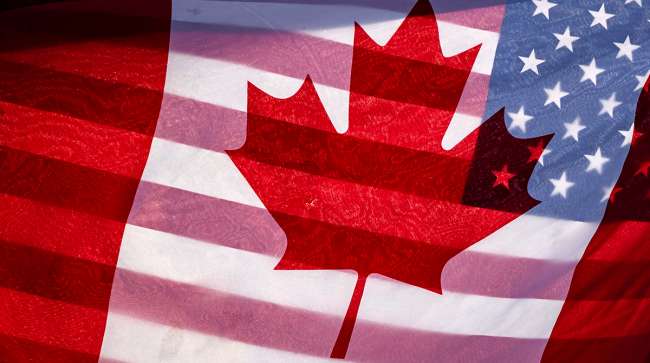Sunlight shines through the flags of Canada and the United States.(Justin Tang/The Canadian Press via AP/File)
Canada will put 25% retaliatory tariffs on U.S.-made vehicles in response to the Trump administration’s import taxes on foreign autos, Prime Minister Mark Carney said April 3.
The Canadian tariffs will apply to vehicles that aren’t compliant with the U.S.-Mexico-Canada Agreement, and on the “non-Canadian content” in cars and trucks that are shipped from the U.S. under the rules of that trade deal.
In other words, the Canadian auto taxes largely mirror the structure of the U.S. auto tariffs — but they won’t apply to auto parts.
Canada was spared President Donald Trump’s so-called “reciprocal tariffs” announced on April 2, but new 25% tariffs on foreign-produced autos imported into the U.S. still took effect April 3. For Canada, which shipped 1.1 million cars and light trucks to the U.S. last year, those tariffs apply to the non-U.S. content of finished vehicles.
Carney announces 25% tariffs on U.S.-made vehicles not compliant with CUSMA https://t.co/faxCEdahl1 pic.twitter.com/Z0tzTu7A55
— The Globe and Mail (@globeandmail) April 3, 2025
Canada’s auto sector is heavily integrated with the U.S. and stands to take a blow from Trump’s tariffs. Stellantis NV, owner of the Jeep and Chrysler brands, has already announced it will shut down its Windsor, Ontario, assembly plant for two weeks as it sorts through the impact, the company said in a memo to employees.
Hefty U.S. levies also remain on products that do not comply with the U.S.-Mexico-Canada Agreement, as well as steel and aluminum products. Trump has also threatened to add new duties on pharmaceutical drugs, semiconductors, copper and lumber.
The Canadian tariffs will not affect vehicle content from Mexico, because the Mexican government is “respecting” the USMCA agreement, Carney said.
By structuring the Canadian tariffs so that they are similar to the U.S. ones, Carney is attempting to strike a balance — responding to the trade war without escalating Canada’s retaliation beyond what the Trump administration has already done.
Carney said Trump has done nothing less than upend the global trading system. “Although their policy will hurt American families, until that pain becomes impossible to ignore, I do not believe they will change direction.”
Deepti Yenireddy of Boon.ai explores how artificial intelligence is transforming workflows in the trucking industry. Tune in above or by going to RoadSigns.ttnews.com.
Shares of auto parts makers such as Magna International Inc. and Linamar Corp. extended their losses after Carney’s announcement.
Despite the hit to the auto sector, National Bank of Canada economists Stefane Marion and Matthieu Arseneau said in a report that the effective trade-weighted tariff rate on Canadian exports to the U.S. remains below 5% because the country’s overall economic exposure to the newest round of U.S. tariffs is limited.
“However, this short-term relief may be fleeting,” they wrote, considering the likelihood of a global economic slowdown or recession. “Unless the U.S. administration reverses course, the Canadian economy remains on track for a noticeable deceleration throughout the remainder of 2025.”







